Can I use my GoPro as a dashcam? Yes, it is well-suited for that setup. In this post, you’ll learn how to configure your GoPro dash cam, including settings and mounting kit. And I’ll make a recommendation for a better way. Let’s get started!
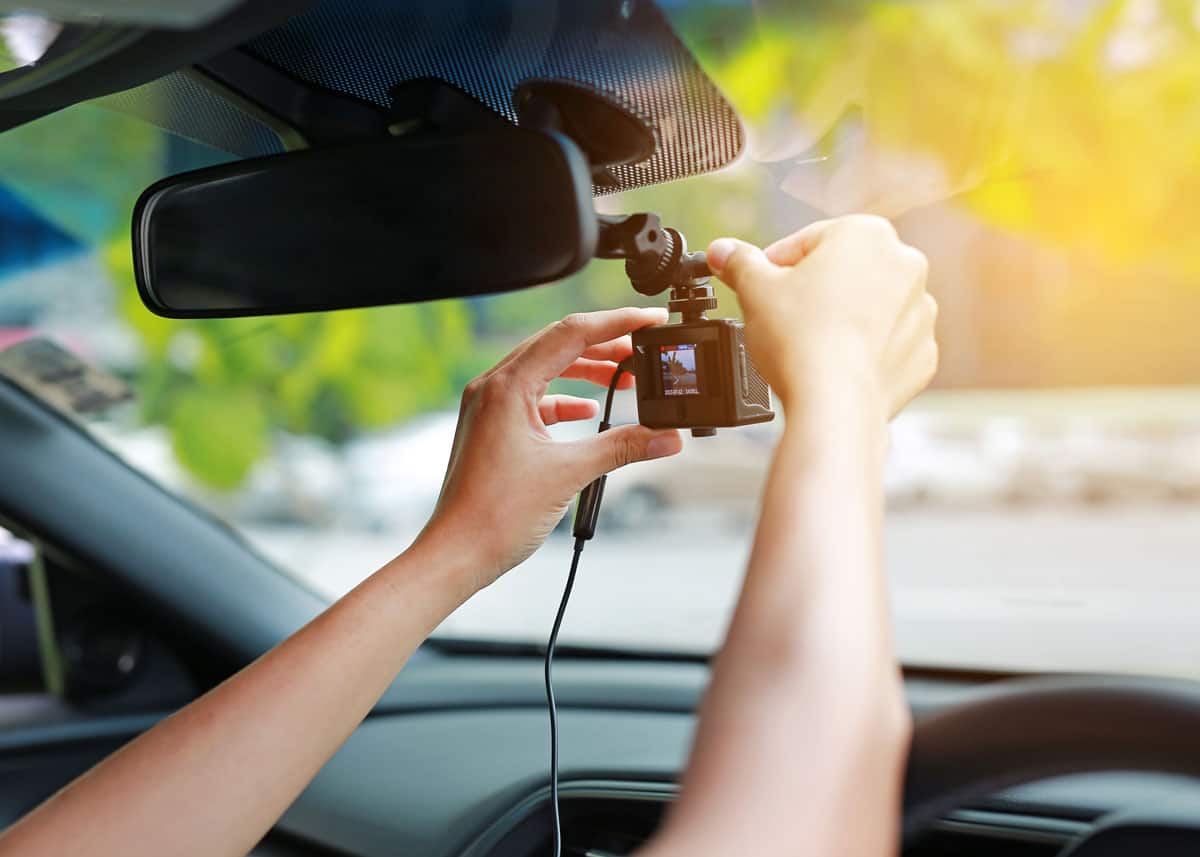
How to Use GoPro as Dash Cam
Before we get started, I need to get something off my chest.
I don’t think using GoPro as a dashcam is the best idea.
Sure, for a single trip (or in a pinch) it can work well. But I recommend using tech for the reason it was created.
- GoPro cameras work best outside and underwater – they are for adventures.
- Dash cams work best permanently installed in your car. They record accidents and other bizarre activities. Boring, but it serves a purpose.
So while your GoPro can serve as a dash cam, I don’t think it’s a good long-term solution.
See more below on why GoPro isn’t well suited to this job.
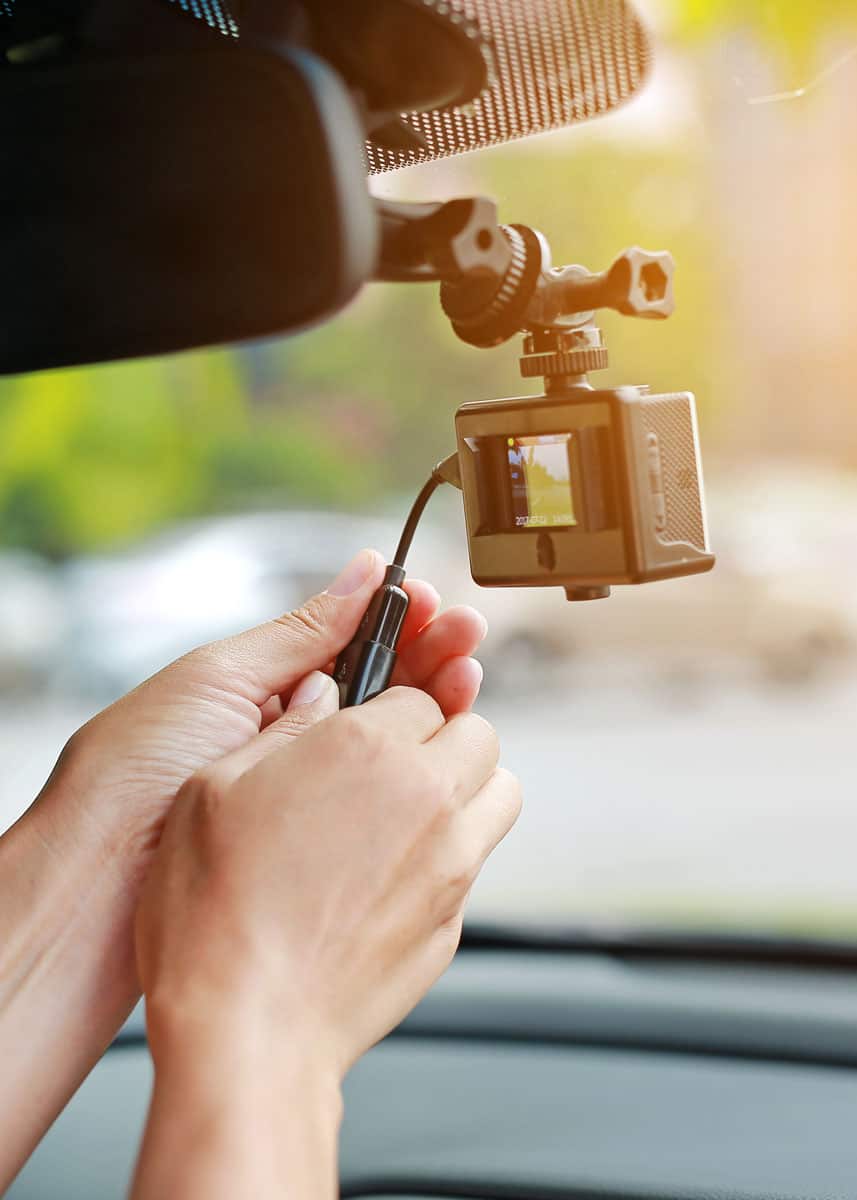
Settings and Gear for Dash Cam Setup
Okay, so you are determined to set this up. That’s okay. GoPro will capture tons of detail and tell a great story of your trip.
Here’s what you need to know.
GoPro Dash Cam Settings
The settings are surprisingly simple for this setup.
- Resolution: 1080P Superview If you want to use the footage for accident proof only, you don’t need super high resolution. The higher the resolution, the more space it’ll take up on your card. Most dash cams shoot at this resolution.
- Looping: 20 minutes. You can set a number of looping intervals. I recommend setting long enough to capture all of an incident (like a fender bender). Any shorter, and you might not get it all. And longer might not be necessary. You decide.
By setting up a loop, you’ll be sure to always have the last set number of minutes of your journey. Be sure to adjust the loop period depending on the type of trip you’re taking and how much you want to capture.
What is GoPro looping? Looping enables continuous recording by overwriting the beginning of the clip with new footage. Loop intervals range from 5, 20, 60, 120 minutes and MAX. Looping allows you to capture that most recent activity – without filling up your memory card.
Note: Be sure to turn Protune off for looping. It can’t be enabled for this recording setting.
Make sure to stop the looping once you capture the action. Otherwise, it will record a new loop over what happened.
Dash Cam Gear Kit for GoPro: 3 Things
There are just three things you’ll need to set this up. You’ll need a way to mount it (mount and housing) and power it (12V adapter).
1. 12V Accessory Adapter: If your car has USB outlets, you can skip this item. If not, you’ll need an adapter to power your GoPro via USB cable.
I’m a fan of a simple adapter like this one. It will charge the camera and another device at the same time. Also, because it sits flush against the car body, it won’t be easily knocked or bumped.
2. Skeleton Housing: This is important for two reasons. You’ll need to access the USB input to power the camera while it’s in use. And the waterproof housing will keep it too hot.
You won’t need housing for the newer models, like the Hero8 through Hero11 Black. They have “folding fingers”, a small built-in mount that will attach to your windshield mount.
3. GoPro Windshield Mount: Without question, the best windshield mount that I found is the Delkin Fat Gecko.
I filmed a full series of driving videos in Ecuador – with a GoPro on this mount. The roads can be bumpy, and I was driving a big old truck. And yet the mount didn’t flex at all. See Fat Gecko price on Amazon
Interested in other options? Here’s a piece I wrote about the best GoPro car mounts. One of them should work.
I have used my GoPro cameras as dash cameras. Here’s one of the videos I shot with the Fat Gecko, with the camera on the inside of the windshield.
Here are a few more things to know as you get setup:
- Turn your GoPro on every time you want to record. This isn’t a big deal. But I know that I would often forget if I had to hit the record button manually.
- GoPro battery life is notoriously short: You’ll want to take short trips (1.5 – 2 hours max) or direct power it via USB from the 12V cigarette lighter or USB port in your car. Here’s more about GoPro battery life and how to make them last longer.
- High temperatures can harm your camera: Remember to remove your camera if you’re going to leave your car for any time on a hot day. Or if you are going to leave your car somewhere, a thief might notice your fancy action camera in the window display.
Using the correct GoPro accessories will make your dashcam work correctly and give you the quality footage you’re looking for.
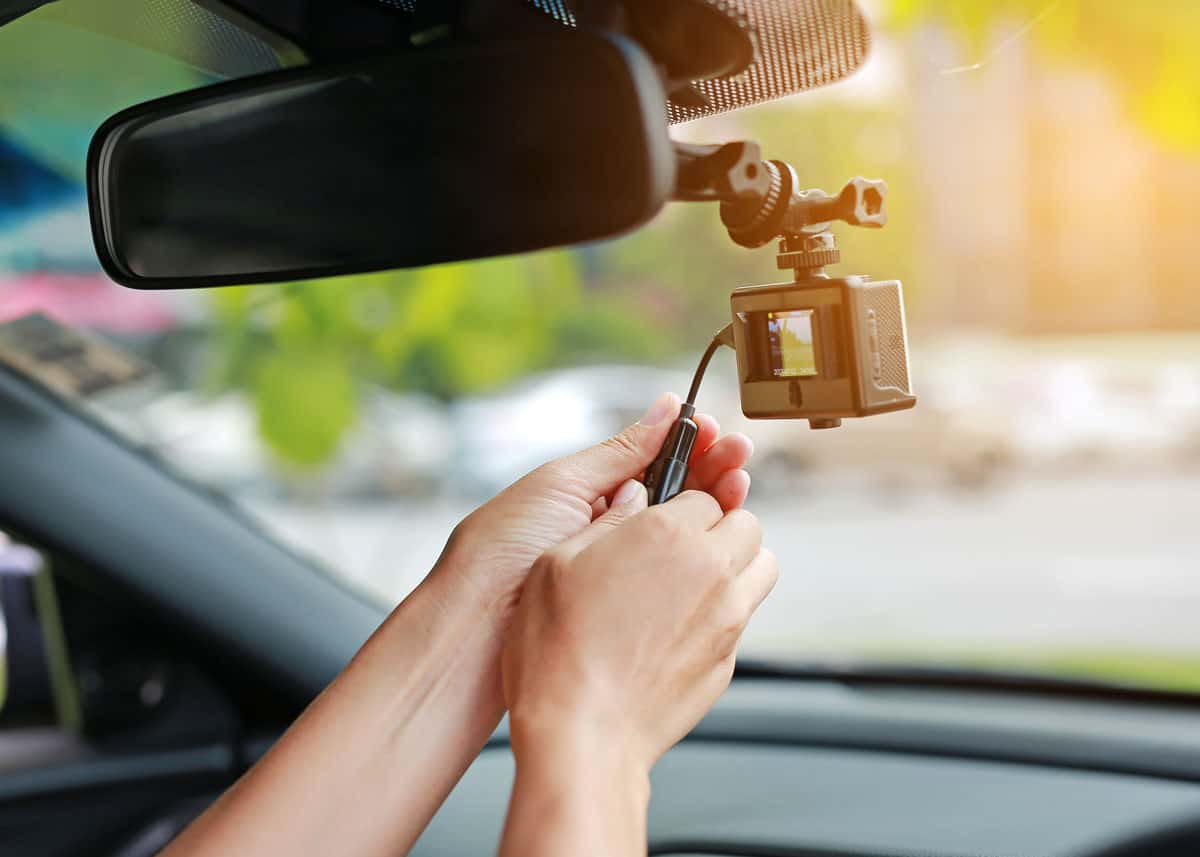
3 Reasons Not to Use GoPro as a Dash Cam
So while your GoPro can do the job, there are some valid reasons not to use it as a dash cam. Here are a few to consider:
1. Theft target: Vehicle break-ins are usually opportunistic. A shiny new GoPro camera (worth hundreds) will catch the eye of any thief walking by. And your broken window will likely cost more to replace than your camera.
Contrast that with a $50 dashcam, and you can see the difference.
2. Heat damage: High heat is like kryptonite to a GoPro camera. The last thing your new camera needs is to be mounted on a windshield on a hot summer day.
- How hot can GoPro withstand? According to GoPro tech support, Hero cameras will shut off if temperatures exceed 125F (52C).
- How hot can a car get? According to Live Science, your car’s dashboard can reach temperatures of 157 degrees F (69 degrees C), on a hot day (95 degrees Fahrenheit, 35 degrees Celsius) within 1 hour. That’s 32F degrees hotter than it will even function!
3. Miss out on actual dashcam features: GoPro wasn’t designed as a dashcam, so it just doesn’t have the best features for this application.
Here are some standard dashcam features that GoPro doesn’t have:
- Hard wired into the car’s electrical system: you’ll never worry about batteries or USB wires with an actual dash cam. Just start your car, and it will automatically start recording.
- Built-in GPS and shock sensor: If you have an accident, your dashcam will auto-record the location, speeds, and footage of the incident. The shock sensor will tag the footage so it won’t get overwritten.
- Designed to be permanently installed, so it will always be ready to film. You know, it won’t accidentally end up in the bottom of your hiking pack … like might happen to someone else.
- Monitor your parked car in “Parking Mode.” A dash cam can actively watch your car while it’s parked for the night or while you’re shopping.
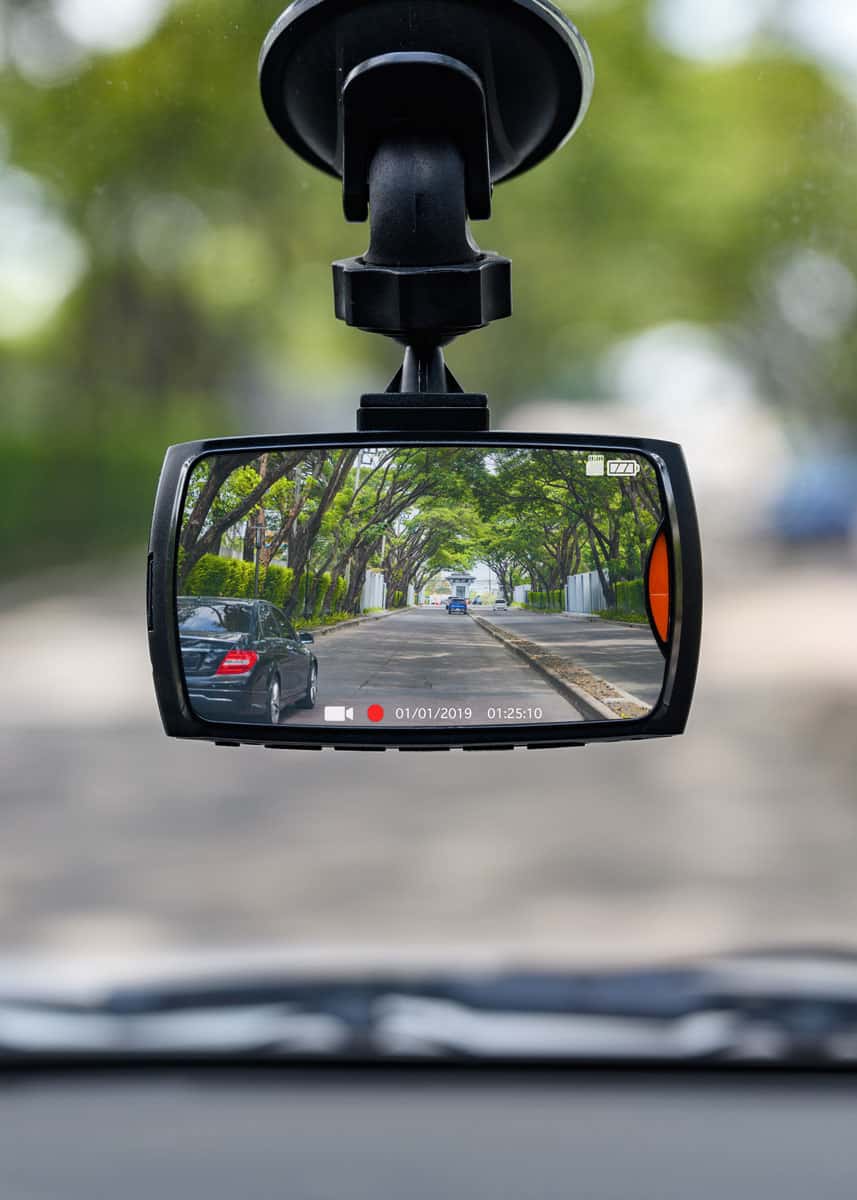
5 Reasons to Use a Dash Cam
- Capture evidence of a car accident: This is probably the most common reason for setting up a dashcam. With a crisp video of traffic lights, car positions, etc., it is no longer his word against mine.
- Monitor your car while parked: Many dash cams will monitor activity around your car while it’s parked. And help catch thieves and vandals. It won’t stop the crime, but it might help with claims and charges.
- Prevent insurance fraud: Avoid being a victim of extortion by showing how an accident occurred.
- Report bad drivers: With video footage as proof, you can report dangerous and bad drivers.
- Record your road trip: This is my favorite reason. When we lived in Cuenca, Ecuador, we filmed much of the city. Here are 12 Cuenca tour videos. This can capture memories from a special trip or give great content for a blog or vlog.
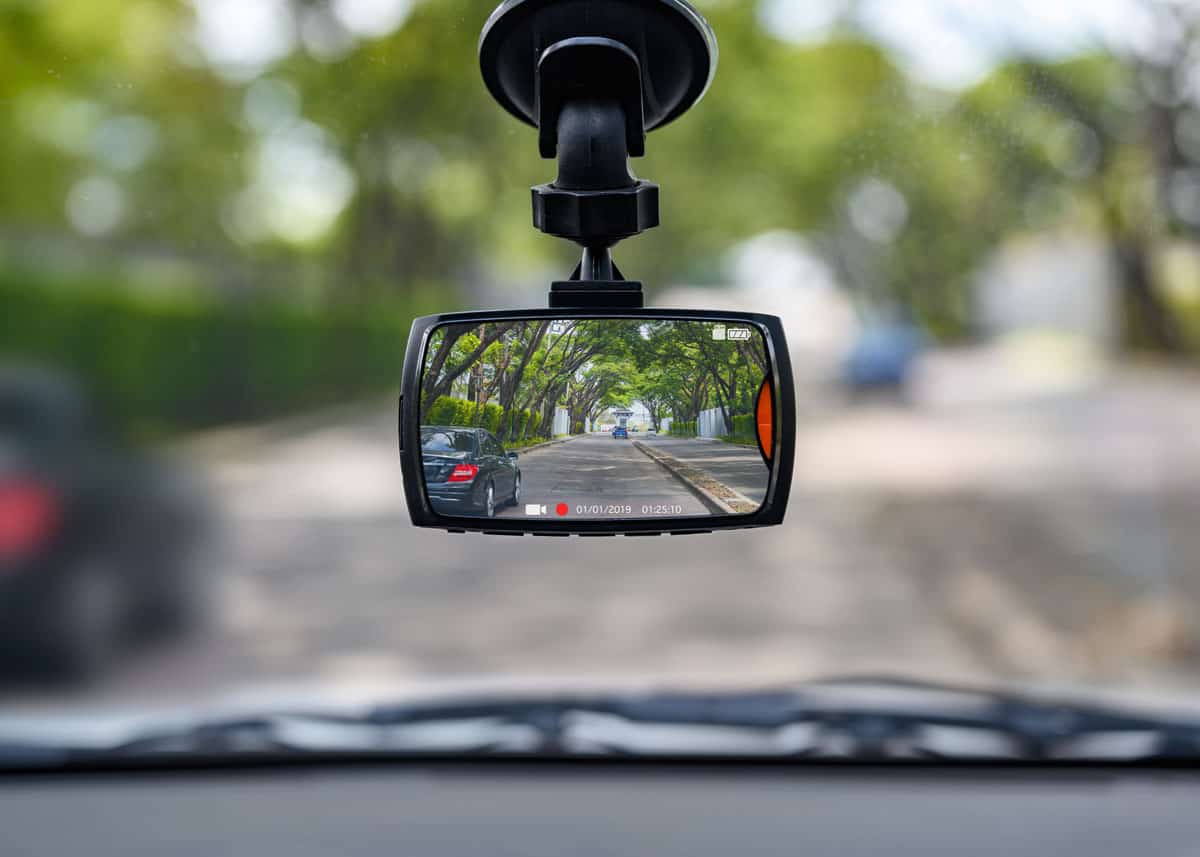
How do I turn off my GoPro? Check out our guide to all models
What’s the Best Dash Cam?
So as you have probably noticed, I don’t think that GoPro makes the best dashcam. In a pinch, it’ll do fine. Or for a special trip, it will capture some amazing footage.
But if you want a dash cam that’ll do dash cam stuff, I recommend buying a dash cam. Here are a few to consider.
1. Rove R2 4K Dash Cam
Rove makes a 4K dash cam with a 150-degree angle. Its built-in G-sensor detects a sudden shake (collision) and locks the footage to prevent it from being overwritten.
Has motion detection, a parking monitor, and seamless loop recording. Comes with a suction and adhesive mounting option. Its F1.8 aperture works great at night.
And this costs about the same as the mounts needed to turn a GoPro into a dash cam. And this camera has built-in WiFi to connect to your phone (Android and iOS) to transfer videos.
If you prefer a known tech brand, you might consider a Garmin dash cam.

 2. Mirror Dash Cam
2. Mirror Dash Cam
If you prefer a more incognito option, you’ll love this 1080P mirror dash cam. It mounts on your rearview mirror and includes two cameras (front and back).
It has the same features as above (parking, G-sensor, GPS, etc) but with dual cameras and less visible tech. Here are a couple of good options on Best Buy and
Both dash cams take micro SD cards – allowing you to capture many hours of driving footage.
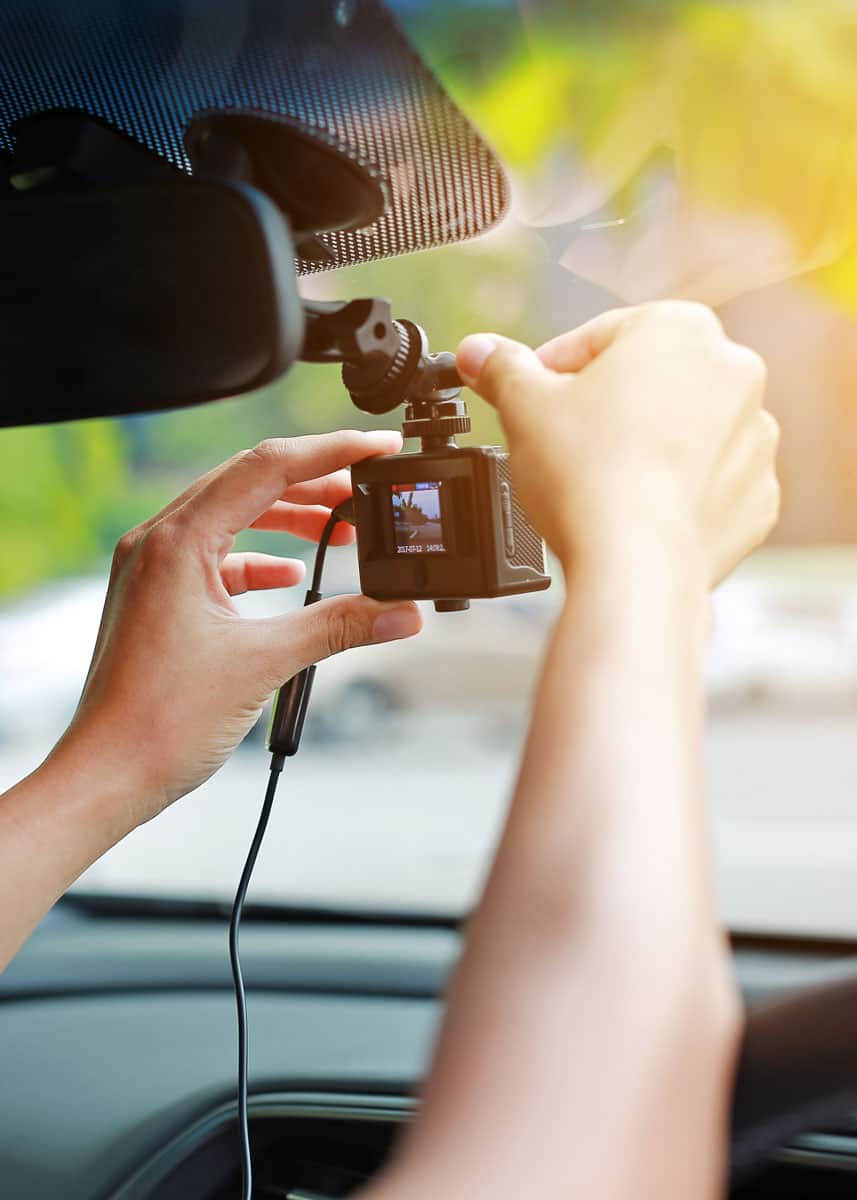
More reading: 13 GoPro Driving Tips
Your Turn
Have you used your GoPro as a dash camera? What setup/settings did you use? What do you want to capture on your dash cam? Let me know below!
- About the Author
- Latest Posts
Hey, I’m Bryan! I’m a content creator and co-founder of Storyteller Tech.
Experienced GoPro Videographer: I’ve been shooting with GoPro cameras for over 11 years. My first GoPro was the Hero3 Silver, bought for a Galapagos work trip in 2012. Today I own 20+ action cameras, including GoPro, DJI, and Insta360 cameras.
Professional Creator: Dena and I have developed video and content marketing plans for numerous international travel brands. And we also run several content businesses.
Bryan also creates at Storyteller.Travel and is co-founder of Storyteller Media, a Canadian-based publishing company.




Alex
Tuesday 23rd of August 2022
Dashcams are the better solution when you own the vehicle, but we're looking at how to have dash cam protection in a rental. SO the parking monitoring is out, as well as even worrying about the normal installation (hiding wires etc). Looks as though the big drawback is: no shock processing that triggers the event and captures GPS simultaneously. Hopefully, the resolution and night capability of a Hero 7 & 10 matches (beats?) most dash cams.
Marius
Wednesday 18th of November 2020
Hi, I use gopro hero4 as my dashboard and I am satisfied. The only problem I have is with the battery as it holds too little and the assembly and disassembly. The image is very clear, I have a 64 GB microSD card that shoots over 4 hours in full hd format.
Ed Hatherley
Saturday 22nd of August 2020
Hi. I recently bought a Hero 7 Black. I have it suction mounted to the inside of my windshield and have it set for voice activation. I use it mainly when I go for my evening sunset drives and looking for wildlife to capture. I generally just use 1080 p settings, sometimes using protune to adjust iso and exposure etc for low light conditions. So far so good. It's not always the greatest in low light, with the footage coming out a little grainy and jittery. But in good light, I have had no problems, cept for some jitters if the road is rough. Guess the stabilization isn't the best on the the 7 Black? or maybe it's my mount. Have a new mount that is recommended on your mounts page, on the way. If you have any suggestions for this jittery/grainy footage, please advise via email. Thanks, Ed.